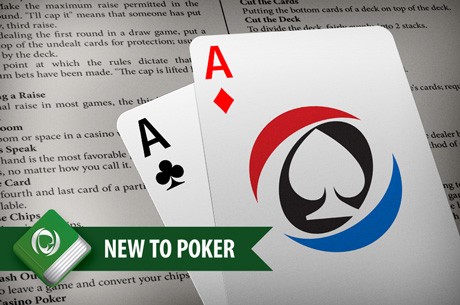Important Poker Rules for Beginners to Know

It has been observed that the rules of poker tend to be whatever the players agree the rules are going to be. In other words, poker is a uniquely flexible game that allows for all kinds of variations covering how hands are made, how betting is conducted, and how winners and losers determined.
That said, there are a number of basic poker rules that more or less have to be observed no matter what the variant is. These are the rules every beginning player must get acquainted with from the very start.
Poker Hand Rankings and the Order of Play
Anyone who has played a game of poker is going to be familiar with things like hand rankings and the order of play. Hand rankings must be learned and committed to memory early on, as they influence all aspects of strategy.
For most poker games in which the highest-ranking five-card poker hand wins, "high card" hands containing no pair rank the lowest, then in ascending order proceed to one-pair hands, two-pair hands, three of a kind, a straight, a flush, a full house, four of a kind, a straight flush, and finally a royal flush.
Rules governing the order of play dictate who acts first and how all subsequent action proceeds when betting and/or drawing cards. Those rules can differ depending on the variant, but all poker games have them. For instance in Texas hold'em, the "under the gun" player sitting to the left of the big blind acts first before the flop, with action following around the table in a clockwise fashion. Then after the flop the small blind (or player nearest to the small blind still in the hand) acts first.
Rules about Betting
Poker betting rules also differ depending on the game, although once again there are certain guidelines regarding betting that cut across all sorts of different poker games.
In most games, including when you play online poker games and when you play live in a cardroom or a home game, the rule is "table stakes" only. That means that during a given hand players are only allowed to use the money already on the table at the start of the hand and not introduce additional cash to bet before the hand is over.
The "table stakes" rule is one that often gets ignored in movies and television programs featuring poker scenes, especially those set in the Old West when the rule wasn't as prevalent. Robert Woolley discusses the significance of "table stakes" and the distinction with "open stakes" in an entry in his "Casino Poker for Beginners" series titled "'Table Stakes'; or, No, You Can't Bet Your Covered Wagon."
Most games have forced bets to help encourage action, including antes and blinds. In a game of hold'em, for instance, there's always a small blind (SB) and a big blind (BB), with the SB being one-half of the BB. (As noted above, where the blinds are located helps determine the order of play as well.)
Fixed-Limit, Pot-Limit, and No-Limit Games
Meanwhile, in addition to the table stakes rule and forced bets, different poker games have different rules dictating how bets are made.
In fixed-limit games, players are restricted to betting a certain amount. For example a fixed-limit hold'em game with limits of $1/$2, players must bet $1 before and after the flop, then $2 on the turn and river. Raises can only be that same amount, too — say a player bets $2 on the turn, another can raise but only to $4 total. The number of raises is often "capped" as well per betting round.
In pot-limit games, players are also restricted but can bet up to the amount already in the pot at the time they make their bet. For instance, in a pot-limit Omaha game with $1/$2 blinds, the first person who bets must bet at least a minimum of $2 (calling the big blind), or can raise up to $7 total --the $2 call of the BB makes the total pot $5 (the $1 SB, the $2 BB, and the $2 call), then the player can match that $5 for a total bet of $7.
No-limit betting is found in the most popular poker games, especially no-limit hold'em. In those games, players are allowed to bet everything they have any time the action is on them, with no restrictions on betting amounts (other than the "table stakes" one, of course).
"String Bets" and the "One Chip Rule"
Finally, a couple of other rules concerning betting have to do with the action itself, namely, the prohibition against "string bets" and what is sometimes called the "one chip rule" regarding betting.
A "string bet" refers to a player trying to make a bet (often a raise) but failing to put all of the chips forward in a single motion, instead putting out some and then taking a second trip back to the stack to get more chips to bet. This two-part motion isn't allowed unless the player has verbally declared the raise beforehand.
The rule against string bets keeps players from putting out some chips and waiting to see how an opponent reacts before putting out some more. This is another rule you often see ignored in movies, by the way, when a player says "I'll see your $100," then after a dramatic pause adds "and raise you $200!"
The "one chip rule" dictates that if one player bets then a second player puts just a single chip forward without making any sort of verbal declaration, that action of betting one chip will be interpreted as a call and cannot be a raise. Thus if the first player bets $5 and the second player puts out a $25 chip without saying anything, the second player has only called the bet and not made a raise.
Still More Rules
Hand rankings, the order of play, and rules about betting cover most of the basics when getting started with poker. Then come still more rules new players especially might not appreciate at first, but they eventually become second nature to most.
Some of these rules include not acting out of turn, not showing your hand or revealing what it is while the hand is still going on, and not talking about the cards you folded (or anything else that might affect the action) when others are still playing the hand.
There are many other "unwritten rules" having to do with following expectations, ranging from protecting your hand from being seen by others and putting your high denomination chips in front to others having to do with tipping, not being abusive to dealers or other players and other matters of etiquette.
And we haven't even gotten into other "rules" regarding strategy — like understanding the importance of position, starting hand selection, bet sizing and so on.
If you're a relatively new player or if you play online poker games a lot but haven't tried to play live yet, you may have a good handle on the basic rules governing game play but many other rules may be new to you. Indeed, for even the most experienced poker players, the learning never stops.








